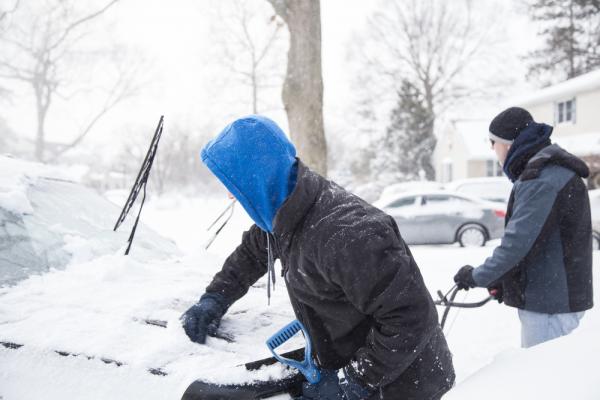Last Thursday, as I carefully navigated my way home from work on the slippery streets of a few Chicago suburbs, I was listening to a talk radio program. The host reminded his listeners that he broadcasts from sunny Arizona, and then he said, “I know that many of you have had large amounts of snowfall. I recommend that you sit back and enjoy the beauty of the snow.”
At which point I yelled some expletives about what he could do with his recommendation and promptly changed the station.
It’s been a brutal winter. Indeed, we’ve already had “large amounts of snowfall.” Yesterday in Chiberea (that’s an amalgamation of Chicago and Siberia, for those keeping score), the high was negative 13 and today the high will be positive 3. Yay for staying positive, Chicago.
Staying positive about the weather is becoming more difficult. The snow, while pretty, will be here from late November to early March. It. Gets. OId. And schools have been canceled for two days in a row. Listen, I love my kids, but they’ve been stuck inside for the past five days. We are all experiencing cabin fever.
But there’s one thing about Chicago winters that I can appreciate. The relentless snow and the extreme cold provide an opportunity to build a sense of community. Neighbors suffer through this weather together. We check in on one another to make sure people are surviving and staying warm. And, of course, we create a sense of community by uniting against the weather. The snow and the cold become our common enemy. Or, as René Girard’s mimetic theory puts it, the weather has become our scapegoat.
On Sunday morning when it was positive 15 degrees, which now seems like a veritable heat wave, my neighbor and I went out with our snowblowers to clean the neighborhood driveways. He came over to help me with one particularly difficult driveway and yelled over the noise of our machines:
Are you sick of this shit yet?
Yeah I’m sick of this shit! I responded.And in about two hours I’m going to be preaching at church. I think I’ll tell the congregation I’m sick of this shit!
We laughed and then he said, Have them pray that the good Lord will do something about this weather.
My neighbor and I united against the snow and I started to wonder if it’s okay to unite against the snow and the cold. So, I went to Facebook and asked, “Is it okay to scapegoat the weather?” The Girardian community, which never disappoints, had some great answers:
JC: No, but it’s all so human no matter what ... You are still forgiven
Gret: Agree with JC. The weather is a person too.
Jacob: I think we should go ask Girard in person. Which would require us to go to California.
(Jacob, my fellow Chiberian, For the Win)
Kathy: I have actually been thinking about this ... specifically about the fact that a leading social psych answer to group rivalry is to get the two conflictual groups working interdependently to overcome some obstacle. Is this such a robust finding because of the power of scapegoating? Can we say that “the obstacle” is being scapegoated?
Scapegoating is “all so human” as JC said. One of the blessings of mimetic theory is also a curse: Understanding how the scapegoat mechanism works is important for creating a more peaceful world so that we can avoid doing it, but once we understand the mechanism we begin to discover the various ways in which we continue to nonconsciously participate in scapegoating. For example, my neighbor and I didn’t think, “Oh, let’s find a quick sense of unity by scapegoating the snow!” It just happened.
Kathy alluded to social psychology’s answer to overcoming group conflict by uniting against an obstacle. This is one instance where social psychology and mimetic theory have some very interesting parallels. The most efficient way to find social cohesion is to work against an obstacle. I don’t know if social psychology would call that scapegoating, but mimetic theory definitely would.
But, really, what’s the problem with scapegoating the weather? I think Gret’s comment points to the answer. Of course, the weather is not a person per se, but the problem with the scapegoating mechanism is that it is addictive. Once we start to find unity against a common enemy, we will repeat the scapegoating process. It will become a ritual that might start with “harmlessly” scapegoating the weather, but soon it will turn into scapegoating that neighbor three houses down who blows the snow only out of his driveway and never helps us blow snow out of the neighborhood.
What a jerk.
So, what’s the answer to scapegoating the weather? JC’s emphasis that scapegoating is “all so human” is a great place start. Scapegoating is something we constantly find ourselves doing. When he was scapegoated, Jesus prayed, “Father, forgive them, for they know not what they do.” Jesus knew something important about human nature. We scapegoat without knowing what we do. And we can trust in his prayer, that God forgives us for it. Once we accept that forgiveness, we can begin to forgive ourselves for getting caught up in the mechanism, and begin to forgive others for it, too.
Or we could just move to California.
(JC's and Gret have excellent blogs where they explore mimetic theory. You can read JC’s contributions to the website [D]mergent and Gret at her blog Beyond Rivalry.)
Adam Ericksen blogs at the Raven Foundation, where he uses mimetic theory to provide social commentary on religion, politics, and pop culture. Follow Adam on Twitter @adamericksen.
Photo: Littleny/Shutterstock
Got something to say about what you're reading? We value your feedback!
